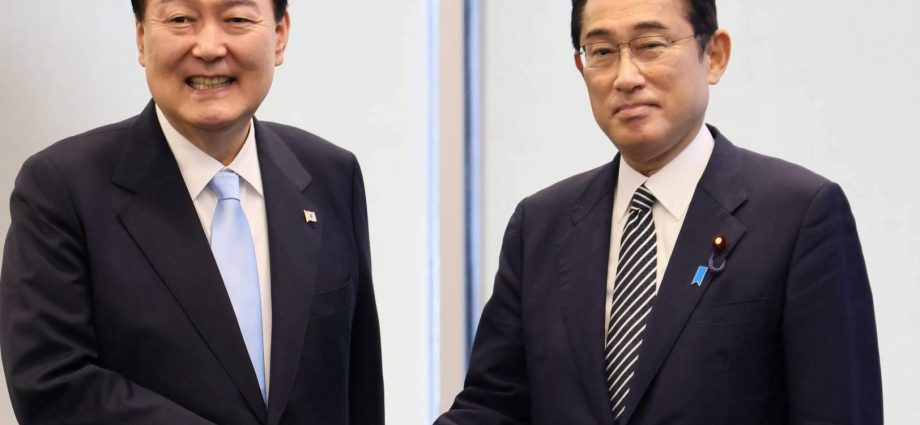TOKYO – South Korean President Yoon Suk-yeol’s recent visit to Japan took an often backward-facing relationship and reset it looking forward, at least for the time being. The US was pleased to see its two allies working together rather than arguing about history.
Yoon spent two days in Japan, meeting with Prime Minister Fumio Kishida on Thursday, March 16, and attending the Korea-Japan Business Roundtable and visiting Keio University the following day. At Keio, Yoon talked to South Korean and Japanese students about the importance of building a prosperous common future.
It was the first visit of a South Korean president to Tokyo since Lee Myung-bak met with Prime Minister Yoshihiko Noda here in 2011. After that, during the tenure of nationalist Shinzo Abe, relations dissolved into acrimony over abuses suffered by Korea during the colonial period (1910 – 1945) and World War II.
Yoon also met with other leading Japanese politicians, including former prime ministers Taro Aso and Yoshihiko Suga. Suga will be the next head of a group of Japanese Diet members dedicated to promoting good relations with South Korea.
Yoon and Kishida agreed to restore cooperation between the two countries in matters of national security and economics. The urgency of the former was underscored by North Korea, which fired another missile into the Sea of Japan just a few hours before Yoon arrived in Tokyo.
After talking with Kishida, Yoon told the media: “We agreed to quickly restore dialogue channels discussing our common interests. I expect to keep communicating through various channels including the launch of a dialogue channel on economic security issues at the level of the National Security Council.”
“We declared complete normalization of GSOMIA so that both countries can share intelligence on launches and the routes of North Korean missiles,” he said, referring to the bilateral General Security of Military Information Agreement that facilitates the monitoring of North Korea.

Seoul threatened to withdraw from GSOMIA in 2019 during a dispute over forced wartime labor. It never did but the intelligence-sharing agreement was downgraded.
At the business roundtable, which was held by the Federation of Korean Industries and the Japan Business Federation (Keidanren), Yoon said:
“To overcome the complex crisis the world faces, it is important for the countries that share common values to join forces and cooperate. South Korea and Japan should work together to handle various global agendas, such as securing supply chains, climate change, advanced science technologies and economic security.”
“We need to cooperate especially in the fields of cutting-edge technologies and new industries of digital transition, semiconductors, batteries and electric vehicles.”
As a first step, it was announced that Japan had lifted restrictions on exports to South Korea of three chemical products used in the production of semiconductors and flat panel displays.
The restrictions were imposed in July 2019 after the South Korean Supreme Court ruled that Japanese companies must compensate Koreans forced to work for them during World War II. Earlier this month, Yoon announced that the South Korean government would do it instead.
The products in question were photoresists used in the semiconductor lithography process; hydrogen fluoride, which is used in semiconductor etching and cleaning and many other industrial processes; and fluorinated polyimide, which is used in the production of organic light-emitting displays (OLED).
In March 2023, Japan’s Research Institute of Economy, Trade and Industry (RIETI) – a Japanese public policy think tank that works with the Ministry of Economy, Trade and Industry (METI) and other government offices – observed that:
- The restrictions caused a large decline in Japanese exports to South Korea of hydrogen fluoride, but not photoresists or fluorinated polyimide.
- Japanese exports of hydrogen fluoride were diverted to the US while South Korea turned to suppliers in Europe, the US and Taiwan.
- Production of these products by Korean companies and the Korean affiliates of Japanese companies increased.
The restrictions were loose in areas. In August 2019, it was reported that Japanese photoresist maker JSR had been allowed to resume shipments to Korea. Its competitors Tokyo Ohka and Shin-Etsu Chemical probably did, too, although it did not make the news.
In 2021, Tokyo Ohka, doubled its photoresist production in South Korea. In 2022, Japanese specialty chemical maker Daikin began producing hydrogen fluoride in Korea. And photoresists that Korea imported from Belgium were made by a JSR subsidiary.
In short, the affair turned out to be expensive theater for the benefit of nationalist politicians on both sides. South Korean semiconductor production was not seriously disrupted and Japanese companies continue to dominate the markets for the three chemical products.
This helps to explain how South Korea and Japan can cooperate in the development of leading-edge technologies. While Korean companies have become world leaders in memory chips, batteries and other high-tech products, they depend on Japanese production equipment and materials. And there are many opportunities for joint R&D.

The Federation of Korean Industries and Keidanren gave high marks to Yoon and Kishida. They want to increase trade and investment and plan to establish a fund to promote exchanges between South Korean and Japanese young people.
Back in Korea, the leftist opposition called Yoon a sell-out and public opinion polls showed that a majority of South Koreans thought he had given away too much for too little in Tokyo.
But hostility toward Japan has started to fade. The same polls show that younger people have a more positive attitude toward their neighbor and South Koreans have recently accounted for about 40% of Japan’s inbound tourists.
At a joint news conference with Yoon, Kishida said, “We will open a new chapter in the Japan-South Korea relationship.” If they can stay in office long enough to make it stick, the prospects for a bilateral reset are good.
Follow this writer on Twitter: @ScottFo83517667

